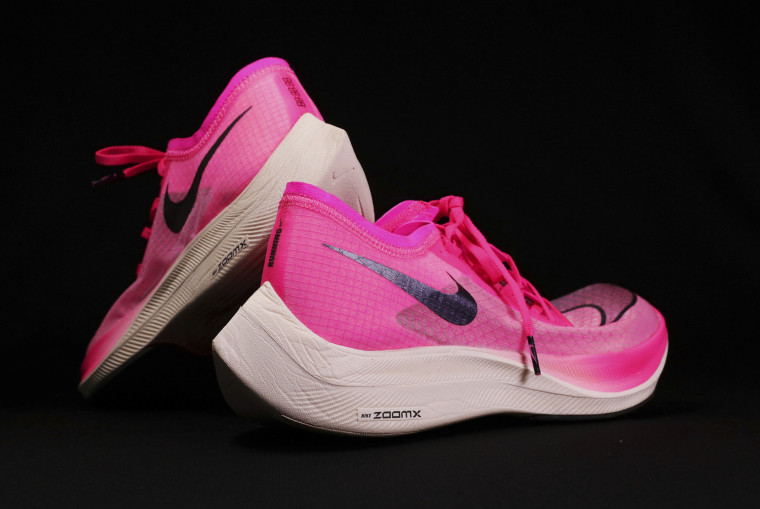World Athletics, the international governing body for track and field, is expected to announce by the end of the month whether it plans to ban Nike's Vaporfly shoes from elite competition amid concern that the shoe's design gives runners an unfair advantage.
The $250 shoes have foam soles and carbon fiber plates in each heel to help propel a runner's stride. Nike calls it "the fastest shoe we've ever made," and the company certainly has a point.
Vaporflys were worn last year by 31 of 36 of the top finishers at the six biggest marathons in the world. Eliud Kipchoge, who became the first person ever to finish a marathon in under 2 hours, also wore Vaporflys as he crossed the finish line in October at a special event in Austria. He completed the 26.2-mile race in 1 hour, 59 minutes, 40 seconds. The same month, Brigid Kosgei set the women's world record by finishing the Chicago Marathon in 2:14:04.
A spokesperson for World Athletics told NBC News that a group of "technical officials, athletes, health and science practitioners and legal experts" has been investigating for months whether the shoe violates a ' rule that shoes used in races must be "reasonably available" to all runners and cannot provide "any unfair assistance or advantage."
"It is clear that some forms of technology would provide an athlete with assistance that runs contrary to the values of the sport," the group said in a statement. It added that the challenge is to "find the right balance in the technical rules between encouraging the development and use of new technologies in athletics and the preservation of the fundamental characteristics of the sport: accessibility, universality and fairness."
Nike defended the shoes.
"We respect World Athletics and the spirit of their rules, and we do not create any running shoes that return more energy than the runner expends," the company said in a statement to NBC News.
The drama has made the shoes must-have items for amateur runners, who give them rave reviews.
"Was skeptical, but given the test run at store bought my first pair. Very light and fit very well to my feet. Started with a short run of 5km and was effortlessly running over a minute a mile faster," said a review for the women's model for sale on Nike's website. "The recoil is truly amazing and you spring into action. Have to be aware that your ankles will feel it with the different support. For my longer run again over 15 km was faster without feeling tired."
The Vaporflys also earned five stars from someone who said they finished their first half-marathon in 1 hour, 53 minutes wearing the shoes.
"These shoes were quite amazing, light, and kept my legs somewhat fresh," they wrote.
Download the NBC News app for breaking news
Matt Powell, senior sports industry analyst at NPD Group, said Nike makes a limited quantity of the sneakers.
"Controversy sometimes drives sales," he said. As of Tuesday night, various Vaporfly models were being offered for sale for as much as $3,664 on StockX, a sneaker exchange platform.
Powell said banning the shoes would be an unprecedented move that could still be a win for Nike. While the circumstances aren't the same, he said, the NBA's threat to fine Michael Jordan for wearing red and black Nikes in the 1980s resulted in a shoe frenzy.
"This launched a $3 billion Air Jordan business," he said.

